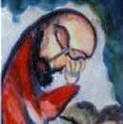|
In his famous Gifford Lectures regarding the nature of religious belief, the American philosopher William James (1842-1910) described the consciousness of death as "the worm at the core" of all that we hope for in the attempt to find lasting happiness apart from God. He wrote: "Make the human being's sensitiveness a little greater, carry him a little farther over the misery-threshold, and the good quality of the successful moments themselves when they occur is spoiled and vitiated. All natural goods perish. Riches take wings; fame is a breath; love is a cheat; youth and health and pleasure vanish. Can things whose end is always dust and disappointment be the real goods which our souls require? Back of everything is the great specter of universal death, the all-encompassing blackness" (James: The Varieties of Religious Experience).
These are sobering and chilling words, and yet the truth is that death is inevitable for us and therefore it constitutes the central question of our existence in this world. Pleasures, wealth, and worldly ambition do not satisfy us but are like chasing after the wind -- they are "havel havalim" (ūöų▓ūæųĄū£ ūöų▓ūæųĖū£ų┤ūÖūØ), the utmost of vanities, as King Solomon said long before the French existentialists expressed the same idea (Eccl 1:2). We live in a world of constant flux wherein ha'kol over (ūöūøū£ ūóūĢūæū©), "everything passes" and nothing abides. Our lives are as a vapor; our days are troubled and our aspirations fail: "My days are like a shadow that declineth; and I am withered like grass" (Psalm 102:11); "I am fading away like a shadow at the end of the day; I am shaken off like a locust" (Psalm 109:23); "What shall I cry? All flesh is grass, and all the goodliness thereof is as the flower of the field" (Isa. 40:6). "For what is your life? It is even a vapor that appeareth for a little time, and then vanisheth away" (James 4:14).
"What profit hath a man of all his labor which he taketh under the Sun? I looked on all the works that my hands had wrought, and behold, all was vanity and vexation of spirit. For that which befalleth the sons of men befalleth beasts; as the one dieth, so dieth the other; all are of the dust, and all turn to dust again. ... The dead know not anything, neither have they any more a reward; for the memory of them is forgotten. Also their love and their hatred and their envy is now perished; neither have they any more a portion for ever in anything that is done under the Sun. ... Truly the light is sweet, and a pleasant thing it is for the eyes to behold the Sun: but if a man live many years and rejoice in them all, yet let him remember the days of darkness; for they shall be many. All that cometh is vanity." (from Ecclesiastes)
James concludes: "In short, life and its negation are beaten up inextricably together. But if the life be good, the negation of it must be bad. Yet the two are equally essential facts of existence; and all natural happiness thus seems infected with a contradiction. The breath of the sepulcher surrounds it." Such is the ambiguity and despair of the human condition.
Hebrew Lesson:
Psalm 119:28 Hebrew Reading:
 |
In light of such harsh realities of our existence "under the sun," where can we find meaning? Where is hope? If all our dreams eventually turn to dust, where can we find substance, where can we find perpetuity, where can we find life? How can we reconcile our inner hunger for life with the transience and pain associated with our mortal coil? These sorts of questions prepare the heart for the message of the gospel, for the gospel message is always a message given to those who are broken in heart, to those in desperate need of healing.
Does all this imply that despair can be curative? Yes, if it expresses the loss of our idolatrous ideals, visions, and dreams... It is hard to let go of old expectations, to give up cherished fantasies, and to find ourselves in a place of emptiness, but we must go through the desert before we can live the promise. We can only grow spiritually when we let go of our romance with the world, abandoning its vain idols, and awakening to the reality of the Divine Presence. We then can turn to God and learn to live in the moment, trusting him to help us through the temptations of the day. We all must walk through the "valley of the shadow of death" to find hope on its other side, and it is only by passing that way can we know the Name of God as the "I-AM-with-you-always" One.
Death is the central problem of life, and therefore to find a solution we must find something that has more power than death, something that can "untrue" death's lie and restore what was originally intended to be our divine inheritance. This is where the resurrection of Yeshua becomes the center of everything we believe as Christian people. The love of God is stronger than death, the mercy of God triumphs over his justice, and the sacrifice of Yeshua makes us right with all that is eternal, abiding, beautiful, and good.... Because Yeshua lives, we shall live also. The resurrection of Yeshua from the dead vindicates our salvation and secures for us eternal life. We are made alive together with Messiah and now live in an entirely different order of reality, free from the law of sin and death (Rom. 7:4, 8:2). God has "made us alive together with the Messiah" (ŽāŽģ╬Į╬Ą╬Čß┐│╬┐ŽĆ╬┐ßĮĘ╬ĘŽā╬Ą╬Į Žäß┐Ę ŽćŽü╬╣ŽāŽäß┐Ę) through the resurrection (Eph. 2:5; Col. 2:13). Our union (oneness) with the Messiah means that we are connected with Him in the spirit. "Likewise, my brothers, you also have died to the law through the body of Messiah, so that you may belong to another, to him who has been raised from the dead, in order that we may bear fruit for God" (Rom. 7:4). We are "raised with him through faith in the powerful working of God, who raised him from the dead" (Col. 2:12).
The resurrection foretells of the destiny and future glorification of the believer. "Because I live, you also shall live" (John 14:19). The resurrection ultimately restores us to a condition of eternal righteousness and innocence in olam haba, the world to come. It is therefore the ultimate expression of tikkun olam, the repair of the world, since even the creation "groans" and laments for the completion of salvation (Rom. 8:22). Creation is weeping for our future salvation! The Messiah's resurrection was the "firstfruits" of many that will likewise experience the glorified state (Rom. 8:23, 1 Cor. 15:20). "Beloved, we are God's children now; it does not yet appear what we shall be, but we know that when He appears we shall be like Him, for we shall see him as He is" (1 John 3:2). The goal of salvation was to reconcile the world back to God in love. In the glorious end, ūÖų┤ūöų░ūÖųČūö ūöųĖūÉų▒ū£ūöų┤ūÖūØ ūöųĘūøų╝ū£ ūæų╝ųĘūøų╝ū£ / yihyeh ha-Elohim ha-kol bakol: "God will be all in all" (1 Cor. 15:28).
The resurrection of Yeshua (i.e., techiyat ha-Mashiach: ū¬ų╝ų░ūŚų┤ūÖų╝ųĘū¬ ūöųĘū×ų╝ųĖū®ūüų┤ūÖūŚųĘ) demonstrates that God is LORD over all. Only the Master of the Universe can resurrect the dead; only God Almighty can swallow up death in victory, and only Yeshua has conquered the grave (1 Cor. 15:54-55). Indeed, all other world religions were founded by people who are now rotting in their graves. Yeshua's resurrection demonstrates that He is LORD and His word is truth (Matt. 24:35; Luke 21:33). We can find courage to face hardship and even death because we know that this world is merely a corridor to the world to come. The dead in Messiah will be resurrected, and those who remain and are alive at His coming will be changed and receive new, glorified bodies (1 Thess. 4:13-18). The resurrection guarantees that those who believe in Yeshua will likewise be resurrected to experience eternal life.
Finally, the resurrection of Yeshua means that He is present for you right now. He is not indifferent to your suffering or "too busy" to be bothered by your struggles. On the contrary, He is "sympathetic to our weaknesses" (ŽāŽģ╬╝ŽĆ╬▒╬Ėß┐åŽā╬▒╬╣ Žä╬▒ß┐¢Žé ß╝ĆŽā╬Ė╬Ą╬Į╬ĄßĮĘ╬▒╬╣Žé ß╝Ī╬╝ß┐Č╬Į) and will help us through the trials (nisayonot) of life (Heb. 4:15). We therefore can come boldly before Him to find grace (ŽćßĮ▒Žü╬╣Žé) for our need (Heb. 4:16). Note that the word translated "boldly" in this verse (ŽĆ╬▒ŽüŽü╬ĘŽāßĮĘ╬▒Žé) means that we can speak freely to God from the center of our hearts -- without fear or shame. Our Savior knows who we are and we do not need to affect an outward show of righteousness in order to obtain His help... The Lord draws near enough to touch us when we draw near to Him (James 4:8). Only a risen and loving Savior can help you through the pain, frailties and temptations of this life; and only living Lord can fill our lives with meaning and purpose so that we are made more than conquerors by means of his great love. Our life in the Lord is never in vain, chaverim....
The most important fact of history, and that which radically transforms everything else - is the resurrection of Yeshua from the dead. Spiritual life means being awake to the risen reality and saving Presence of Yeshua, the One who Overcame and vanquished the power of death. Without Him we are hopeless; with Him we are more than conquerors (1 Cor. 15:14; Rom. 8:37). The resurrection means Yeshua is forever alive, and that today he hears your heart's cry. He is surely able to help you, and nothing can overthrow his invincible will. Our Lord suffered and died for your inner peace and healing, but now death has no hold over him, and he "ever lives to make intercession for you" (Rom. 6:9, Heb. 7:25). He is your compassionate Advocate (ŽĆ╬▒ŽüßĮ▒╬║╬╗╬ĘŽä╬┐Žé, lit. "one called alongside") who gives you heavenly comfort (1 John 2:1). Even more: The very power that raised Yeshua from the dead now dwells in you (Rom. 8:11). The miracle of new life is "Messiah in you - the hope of glory" (Col. 1:27). The Lord will never leave you nor forsake you (Heb 13:5): He "sticks closer than a brother" (Prov. 18:24); He sustains your way, and he will perfect the work of salvation on your behalf (Jude 1:24). In short, there simply is no "gospel" message apart from the resurrection! The resurrection is the victory of God's plan of salvation - His everlasting vindication over the powers of darkness - for your life.
See also:
|


